

Facebook has introduced new measures designed to help users limit how much personal data is accessed and used by third party mobile applications, while it has also launched a mobile ad network called Facebook Audience Network, which aims to help developers generate revenue without selling their own adverts.
Users of the social network have been able to log into apps since 2010, a move which has increased privacy concerns. Facebook will hope ‘Anonymous Login’, announced at the F8 developer event in San Francisco, will ally such fears.
“People tell us they’re sometimes worried about sharing information with apps and want more choice and control over what personal information apps receive,” said Facebook. “Today’s announcements put power and control squarely in people’s hands.”
Anonymous Login provides an easier way for people to try an app without sharing any of their personal information from Facebook (for example if they only want to try an app and don’t wish to share any data).
It complements a revised ‘Facebook Login’, which gives users the option to pick and choose what information the third party app gets. Facebook has also released a ‘Redesigned App Control Panel’ provides users with a centralised location for them to see and manage the apps they use.
The social networking giant also used the developer conference to launch a new service to distribute ads across a network of mobile applications, which could open up a lucrative new source of revenue for the company.
Essentially, the ‘Facebook Audience Network’ allows developers building mobile app to easily insert various adverts into their software. The developers and Facebook share the advertising money this generates.
“This is really the first time that we’re going to help you monetize in a serious way on mobile,” Zuckerberg was quoted as saying.
Facebook is facing intense competition in the mobile app advertising space. Google of course has its AdMob service that allows advertisers to distribute ads to mobile apps. Twitter meanwhile purchased the MoPub ad network last year.
Facebook first introduced mobile app adverts, which allowed developers to show off their products on users’ news feeds, back in August 2012. The company already generates most of its money from adverts that controversially appear in user’s newsfeeds and on its own mobile app. Now with the ability to distribute adverts across a broad range of independent mobile apps, Facebook will expand its advertising reach in order to potentially bring in more money.
Back in 2012, an investigation by the BBC questioned the value of advertising on Facebook and highlighted the disproportionate response that some received from apparently fake user accounts.
What do you know about Facebook? Find out with our quiz!
American space agency prepares for testing of Boeing's Starliner, to ensure it has two space…
As UK and Europe develop closer military ties, European Commission says it will invest €1.3…
Zuckerberg seeks to revive Facebook's original spirit, as Meta launches Facebook Friends tab, so users…
Notable development for Meta, after appeal against 2021 WhatsApp privacy fine is backed by advisor…
First sign of shake-up under new CEO Lip-Bu Tan? Three Intel board members confirm they…
Trump's nominee for SEC Chairman, Paul Atkins, has pledged a “rational, coherent, and principled approach”…